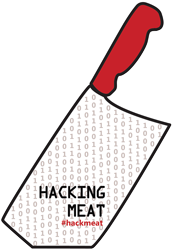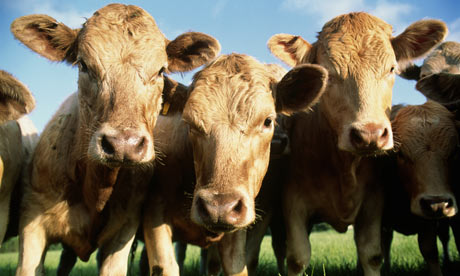Food+Tech Connect and GRACE Communications Foundation present Hacking Meat, an online conversation exploring how information and technology can be used to hack (or reimagine) a more sustainable, profitable and healthy future for meat. Join the conversation and share your ideas or product requests in the comments, on Twitter using #hackmeat, Facebook , Tumblr or at the Hack//MeatSilicon Valley happening June 21-23 in Palo Alto.
Guest post by Joanne Wilson, Author of Gotham Gal
There are a small group of committed people who are thinking about food policy in the United States. We should all say thank god. The issues are wide starting with the reality of what is truly going into our food, sustainable agricultural, food production, nutrition, food labeling, etc. If the majority of us knew the what antibiotics the cows were eating in this country in order to provide meat on the table for our eating pleasure we’d probably freak.Livestock in this country consumes almost 80% of the grains we grow. Of the GMO grains that are grown 98% go to livestock consumption. Beef is a $79 billion industry and over 36 million cows are harvested each year. The good news is there is a huge organic non-GMO movement going on and through technology we can do a better job at tracking what is going into the food that we eat.
I spoke with Claire Herminjard who is the entrepreneur behind Mindful Meats. She has built a company that is bringing local, non-GMO, organic pasture raised meats to the table. At this point her production is limited to restaurants and stores but with technology the hope is that one day she can just ship directly to the consumers who want to know exactly what product they are eating. So how is she doing this? Almost 16% of our beef comes from dairy cows. Certain dairy cows have Government certification that they are organic based on what they eat. When they are done producing milk, butter and cheese those cows are sold to regular production facilities to break down for sale. What Claire is doing is buying organic cows and breaking them down for meat consumption for the marketplace. Those dairy cows are environmentally friendly cows. She began to become interested in what kind of meat she was eating and through research and hard work was able to build a niche business which we can all hope will become bigger over time taking over the majority of the livestock consumption.
Another company that is Mercaris. As the organic non-GMO businesses grow there is a need for more data and information. There are commodity markets from grains to meats but there is not a commodity market separating out the organic non-GMO products. Mercaris is doing this. They are starting with agricultural crops but over time will move into other organic marketplaces. The lack of basic market information is astounding and Mercaris is changing that.
How Good is another company that is giving stores the ability to tag all their products so that the consumer can see how each product is rated. That rating system scores are backed by independent data. What is important here is that each store owner can track more efficiently what products their customer wants and why. If an owner discovers that their consumer is much more interested in non-GMO organic products then they will only want to purchase those products to stock their shelves. The market place is the end-all. If the market tells us they want more organic products then manufacturers will have to get into that market.
I am fascinated with the change in the food industry. Healthier local consumer products, organic non-GMO beef, sites where you can buy the most interesting indie food products being made across this country (aka Mouth), labeling products through private industry as the Government doesn’t seem to be too quick on that one, more farm to table companies and companies such as Sea2Table that will soon be delivering fresh fish to your door. The costs may be higher but we will be healthier and perhaps because of the higher costs we will eat less. I predict that the next decade is going to be a tremendous shift in understanding and participating in the food that we eat at our table. The health economics for our country are huge. These changes will only be a very good thing.
The views expressed here are solely those of the author, and do not reflect the views of Food+Tech Connect.
How can information and technology be used to create a more sustainable, profitable and healthy future for meat?Share your thoughts in the comments below, on Twitter using #hackmeat,on Facebook or at the Hack//Meat SV hackathon happening at The Stanford d.school in Palo Alto, June 21-23.
_______________________________
 Joan Wilson has had many careers. She was a buyer at Macys, ran a company in the rag trade, dabbled in a few friends businesses, spearheaded sales of a start-up magazine/e-zine/events company in Silicon Alley, chaired a non-profit organization focused on technology in inner city schools (that she is still involved with ), sat on our kids school board/exec board for years, sat on a few other profit and non-profit boards and she continues to be involved with start-ups by investing money and time. She has been involved with more real estate transactions ( from beginning to end ) than she cares to mention. She is involved with politics too but tries to keep it on the down low.
Joan Wilson has had many careers. She was a buyer at Macys, ran a company in the rag trade, dabbled in a few friends businesses, spearheaded sales of a start-up magazine/e-zine/events company in Silicon Alley, chaired a non-profit organization focused on technology in inner city schools (that she is still involved with ), sat on our kids school board/exec board for years, sat on a few other profit and non-profit boards and she continues to be involved with start-ups by investing money and time. She has been involved with more real estate transactions ( from beginning to end ) than she cares to mention. She is involved with politics too but tries to keep it on the down low.
Kathy Collins/Getty Images




